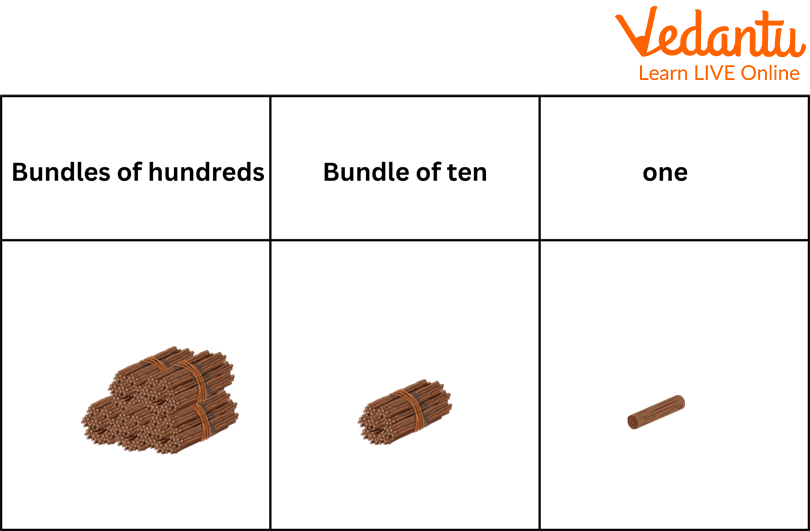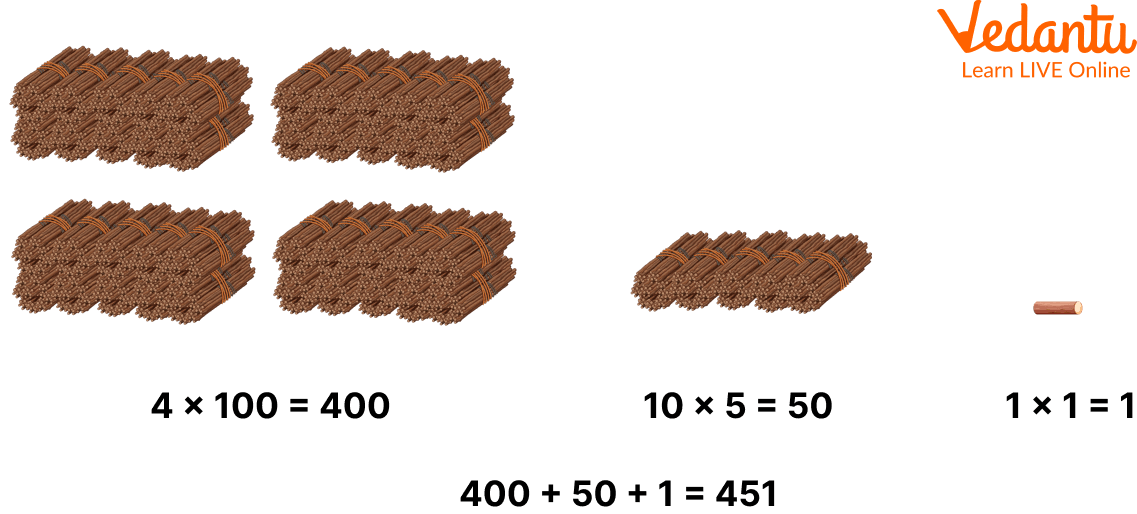




How Does Bundling Work in Maths? Explained with Solutions
For young elementary students, understanding place value is an important maths concept. They need to understand that a digit's value is determined by where it is in a number. A digit's place value in a number is its value in that specific place. For example- the place value of the digit 1 in the number 152 is the hundredth. The number 5 and the number 2 have five at tens and two at one place, respectively. Students can better understand number properties and how larger numbers can be divided into smaller numbers by learning how to bundle numbers. In this article, we will learn about bundling in maths by understanding place value.
Define Bundling
Bundling is also known as a grouping. This method of grouping numbers by combining smaller units to get a bigger one. For example, adding ten ones gives one ten. Adding 10 tens equals one hundred.
Place Value Using the Bundle of 10
We know that the hundreds, tens, and ones are represented by the three digits of a three-digit number.
Consider the following examples:
The numbers 100, 200, 300, 400, 500, 600, 700, 800, and 900 denote one, two, three, four, five, six, seven, eight, or nine hundred. A bundle of tens, or a hundred, can be considered a group of tens (with 0 tens and 0 ones).

3-Digit Number Using Bundling
Use bundles of one hundred with no tens or ones to represent numbers such as 100, 200, 300,... 900.
Let’s see an example of price bundling: Let us assume 1 stick costs 10 rupees. In one bundle, there are 100 sticks. Therefore, 200 is equal to 2 bundles of 10 tens. 3 bundles of 10 tens equal 300.

3-digit Number Bundling
Here we can see that there are 3 bundles of 100, which mean 300, 5 bundles of 10, that is 50, and 6 one.
Therefore the number is 356.
Hence, the cost will become 3560 rupees.
Let us see another example of bundling 451. We know that 4 is at a hundred places, 5 is at tens place, and 9 is at ones. So, 400 is equal to 4 bundles of 10 tens, 50 is equal to 5 bundles of tens, and 1 is equal to one single stick.

Bundling of 451
Solved Examples
Q 1. Represent number 279 using bundles.
Ans: We have given 279, of which 2 is at hundred places, 7 is at tens place, and 9 is at one’s place. Therefore, 100 is equal to 10 bundles of 10 tens, 70 is equal to 7 bundles of tens, and 9 is equal to nine single sticks.

179 Using Bundles of Ten
Q 2. Represent number 93 using bundles of ten.
Ans: We have given a two-digit number 93, of which 9 is at tens place, and 2 is at one’s place. Therefore, 90 is equal to 9 bundles of tens, and 3 is equal to three single sticks.

93 Using Bundles of Ten
Practice Problem
Q 1. Count the number of sticks and write the number.

Bundling of Sticks
Ans: 16
Q 2. Count the number of sticks and write the number.

Bundling of Sticks
Ans: 57
Summary
In this article, we have learned about the place value of a number. With the help of bundling, we have learned how easily we can understand the place values of the numbers. And as we know, bundling in simple terms is the grouping of the numbers and finding the values using it. With the help of sticks, we have portrayed this article to make it easy to understand the concept of place value. Place value is the value of a digit according to its position in the number such as ones, tens, hundreds, and so on. Some solved examples and practice questions are given in this article to make your understanding of numbers easier.
FAQs on Bundling in Maths: Definition, Examples & Exam Tips
1. How does bundling help kids learn to count?
We know that illustrations always help while learning anything. So in the case of bundling, we will have bundles that will help the kids to learn more frequently and easily.
2. What exactly is place value?
Every digit in a number in mathematics has a place value. The value a digit in a number represents based on where it is in the number is known as place value. For instance, the place value of 7 in 3,743 is 700, which is 7 hundred. Even though the digits are the same in both numbers, we can see that their place value changes due to their position.
3. How is place - value chart helpful?
Place Value Chart is a very helpful table format that enables us to determine the place value of each digit based on where it appears in a number. Making a place-value model with actual objects, such as place-value blocks or bundles of sticks, writing the digits in the chart, and then writing the number in the usual or standard form, are excellent ways to see the place-value relationships in numbers.























